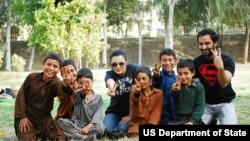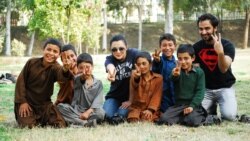Sarah Adeel, a Pakistan native and an alumna of the Fulbright Program, the flagship international educational exchange program sponsored by the U.S. government and designed to increase mutual understanding between the people of the United States and the people of other countries, envisioned a new social service while conducting research on child welfare. She wanted to help street kids in Islamabad to move beyond a life of begging and trash picking, and re-integrate back into society through art, music, and mentorship.
"I was doing a comparative analysis between orphanages and foster-care homes, and these were some of the most abysmal places you could imagine," Ms. Adeel explained. "I spent hours getting to know the children. One day, I asked them to write letters to whomever they missed the most, and most of the letters were addressed to God. When I saw them having nobody but God to write to, I knew I wanted to help these kids who, by the luck of the draw, were born on the roadsides."
An estimated 1.2 million children are on the streets of Pakistan's major cities, according to the Asian Human Rights Commission. Many survive by scavenging at garbage dumps or taking on menial jobs. Others resort to stealing and prostitution. Ms. Adeel returned to Pakistan in 2009 following her completion of the Fulbright Program to launch the LettuceBee Kids, a non-profit organization dedicated to helping these children find a better future, with fellow Fulbright alumni Mohsin Ali Afzal and Zainab Feroz Kapadia, and their colleague Jabbar Bangash.
The United States invests more in the Fulbright Program in Pakistan than in any other country in the world and supports numerous other exchange programs that together have resulted in a Pakistan-U.S. Alumni Network of more than 12,000 registered members. With the aid of a $5,000 Alumni small grant from U.S. Embassy Islamabad in 2012, LettuceBee Kids piloted its art therapy program, offering regular art classes to the street kids of Islamabad.
An art exhibit is slated for February 2013 in Islamabad, and the long term plan is to transform the children's artwork into a greeting card line, in order to generate revenue and make the program self-sustaining. Next up for LettuceBee Kids are a community garden project and the launch of the LettuceBee Band program, which offers music classes to the street kids.
For Ms. Adeel and the LettuceBee team, the goal is to help kids get off the street. “We can't afford not to,” she said. “These children are Pakistan's future.”
"I was doing a comparative analysis between orphanages and foster-care homes, and these were some of the most abysmal places you could imagine," Ms. Adeel explained. "I spent hours getting to know the children. One day, I asked them to write letters to whomever they missed the most, and most of the letters were addressed to God. When I saw them having nobody but God to write to, I knew I wanted to help these kids who, by the luck of the draw, were born on the roadsides."
An estimated 1.2 million children are on the streets of Pakistan's major cities, according to the Asian Human Rights Commission. Many survive by scavenging at garbage dumps or taking on menial jobs. Others resort to stealing and prostitution. Ms. Adeel returned to Pakistan in 2009 following her completion of the Fulbright Program to launch the LettuceBee Kids, a non-profit organization dedicated to helping these children find a better future, with fellow Fulbright alumni Mohsin Ali Afzal and Zainab Feroz Kapadia, and their colleague Jabbar Bangash.
The United States invests more in the Fulbright Program in Pakistan than in any other country in the world and supports numerous other exchange programs that together have resulted in a Pakistan-U.S. Alumni Network of more than 12,000 registered members. With the aid of a $5,000 Alumni small grant from U.S. Embassy Islamabad in 2012, LettuceBee Kids piloted its art therapy program, offering regular art classes to the street kids of Islamabad.
An art exhibit is slated for February 2013 in Islamabad, and the long term plan is to transform the children's artwork into a greeting card line, in order to generate revenue and make the program self-sustaining. Next up for LettuceBee Kids are a community garden project and the launch of the LettuceBee Band program, which offers music classes to the street kids.
For Ms. Adeel and the LettuceBee team, the goal is to help kids get off the street. “We can't afford not to,” she said. “These children are Pakistan's future.”






